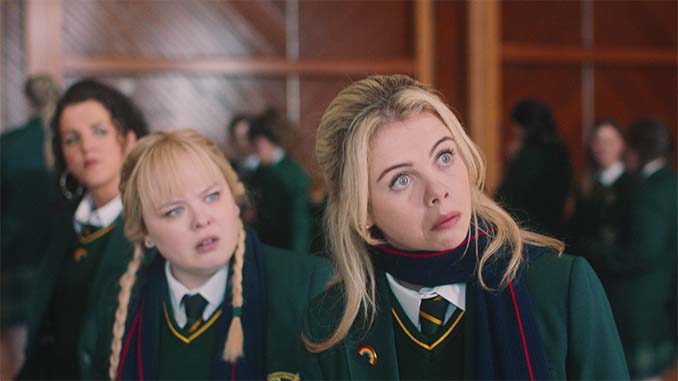The Troubles Are Over, but Life Will Be a Little Dimmer Without the Humor and Heart of Derry Girls
Photo Courtesy of Netflix
Television takes many shapes. It can be heartwarming. It can punch us in the gut. And it can be riotously funny. Few shows do it all, and even fewer do it all well. And yet, teen comedy Derry Girls, about a group of friends growing up in Northern Ireland in the 1990s during the tail end of The Troubles, manages to not just do it, but make it look downright easy along the way. It’s a shame that it’s now come to an end.
At its best, Derry Girls is a laugh-out-loud romp that captures the intoxicating exuberance and selfishness of youth, when everything that happens is either the best or the worst thing that could happen because one has yet to fully experience all of life’s many possibilities, including the harsh and unforgiving realities that have the power to alter lives and not just perception. One might expect that not to be the case for Erin (Saoirse-Monica Jackson, who remains one of the greatest face actors the world has ever encountered), Orla (Louisa Harland), Clare (Nicola Coughlan), and Michelle (Jamie-Lee O’Donnell) given that their lives have been spent amidst barricades and in the shadow of looming violence. And yet, it still rings true because life against the backdrop of political conflict is all they’ve ever known. This rather unique setup allows series creator Lisa McGee, who drew inspiration from her own upbringing for the show, to recalibrate the scales a bit and create a world in which the friends can go about their lives like most teens, charting a path that includes first kisses and loss and friendships and nearly getting into fistfights with grown men over concert tickets. You know, normal coming-of-age stuff. But the signs of unrest are always there in the background.
The juxtaposition of humorous, self-absorbed teenage shenanigans against the threat of terror and violence is what has always set Derry Girls apart from other shows. In the third and, sadly, final season, which hit Netflix October 7, McGee doesn’t alter the formula simply because this is the final chapter. Erin is still selfish. Orla still dances to the beat of her own drum. Michelle is still a wild child. Clare is still obsessed with her studies. And James (Dylan Llewellyn) is still… English. But the seven episodes do serve as both an emphatic ending for the show and a bright new beginning for its characters, as the 45-minute special that serves as the series finale centers on the vote for the Good Friday Agreement, which largely ended the violence of The Troubles.
But prior to the emotional, optimistic coda, which also revolves around Erin and Orla’s joint 18th birthday party (it has a literary-greats-and-monkeys theme, naturally), viewers are treated to a perfectly executed Liam Neeson cameo, a Fatboy Slim concert, a Spice Girls song and dance routine, and a nod to Claire Danes in Romeo + Juliet. Add to that a sudden, devastating loss for Clare, a surprising and yet long-awaited kiss between Erin and James, and a flashback episode that holds a mirror up to the girls’ enduring friendship by showcasing the bonds of their mothers—who even had a James of their own upon a time!—and you’ve got everything that has made Derry Girls one of the best and more entertaining watches of the last half-decade.
Like Hulu’s Only Murders in the Building, the humor of Derry Girls is simple in construction, built around the distinct personalities and interests of the characters, but it is exceptionally well executed. The storylines themselves are not far-fetched and are careful to depict the normality of life. Like iconic teen drama The O.C. before it, the show smartly integrates the teens’ parents—mostly Mary (Tara Lynne O’Neill), Gerry (Tommy Tiernan), and Sarah (Kathy Kiera Clarke), but occasionally the other girls’ as well—into the overarching narrative to paint a fully realized picture of family life at the time. Even when you see what’s coming next—like when the girls break into the school to find out their GCSE results and unwittingly help two men rob the place—the show still finds ways to zig or zag at the last moment. Sometimes the result is an unexpected punchline—like when they bring in Uncle Colm (Kevin McAleer) to bore the authorities rather than notify their parents—but sometimes it’s also a swift knock to the general heart region, like when Sister Michael (Siobhán McSweeney) sends them to clean out her late aunt’s house and the van breaks down, leading the teens to spend the night in a stranger’s home, resulting in the aforementioned kiss.
-

-

-

-

-

-

-

-

-

-

-

-

-

-

-

-

-

-

-

-

-

-

-

-

-

-

-

-

-

-

-

-

-

-

-

-

-

-

-

-








































